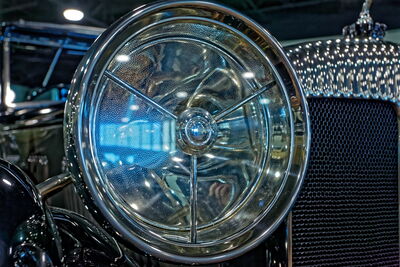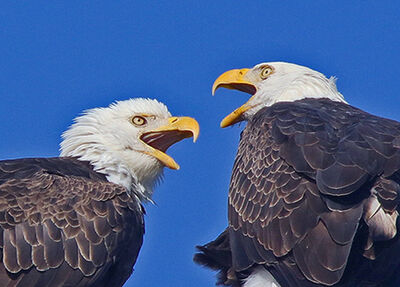Crop sensor camera verses full frame
May 15, 2018 12:42:12 #
I know I'm a late arrival -- The post is now 5 pages long --- FF vs Crop Frame -- Back in 2008 when I finally transitioned from Film to Digital I felt I had no other choice than going FF with the purchase of the Canon 5D2 -- Since I already had a full bag of rather expensive - at least for me -- lenses -- However "If" I had been starting from scratch -- zero investment in lenses -- I probably would have gone with a less expensive lighter crop frame camera --- I do like 20x30 prints & I'm sure I would have tried out the crop frame to see how well it did -- "IF" the crop frame proved it could produce an exceptaple 20x30 print then I would have stuck with it -- Otherwise I would have retired it & gone Full Frame --
May 15, 2018 13:13:35 #
Wont go into what is fact or myth about Mirrorless vs DSLR, there is not enough room for that. But on one point, it is a myth that there is no glass for Sony Mirrorless cameras vs Canon and Nikon. Presently Sony has 41 E-mount lenses in their mirrorless lineup and another 30 A-mount lenses that will fully work in AF-C on Sony E-Mount with Sony adapter. Sigma, Tamron, Samyang/Rokinon, Meike, Laowa, Zeiss and more presently have quality E-Mount lenses for Sony with more to come this year. And Sony has announced even more E-mount lenses this year including a 400mm f2.8. There are nearly 90 lenses available for Sony E-Mount. Top lens manufacturers are seeing the market and making more and more lenses in native Sony E-mount.
How many lenses do YOU need? For my Sony A6500, A7RIII and A7III I have ten lenses covering me from 10mm to 600mm plus 1.4X and 2X converters. And i have preordered the new Sigma Art 70mm f2.8 macro lens to add to my kit. Maybe it was true three years ago, but not anymore when it comes to lenses for mirrorless cameras. Sorry if this is off topic here, just wanted to clear the air on this. Cheers
How many lenses do YOU need? For my Sony A6500, A7RIII and A7III I have ten lenses covering me from 10mm to 600mm plus 1.4X and 2X converters. And i have preordered the new Sigma Art 70mm f2.8 macro lens to add to my kit. Maybe it was true three years ago, but not anymore when it comes to lenses for mirrorless cameras. Sorry if this is off topic here, just wanted to clear the air on this. Cheers
May 15, 2018 13:20:41 #
leftj
Loc: Texas
gwilliams6 wrote:
Wont go into what is fact or myth about Mirrorless... (show quote)
So who are you responding to? Who said there is no glass for Sony Mirrorless cameras?
May 15, 2018 13:29:17 #
olemikey
Loc: 6 mile creek, Spacecoast Florida
When starting out - shoot with what you can reasonably afford (unless money is not the issue) .... sensor size is important, but learning the best photography techniques is required for success, along with getting the best out of what you have. When you can (truthfully to yourself) state that your equipment is somehow holding you up - that may be a good time to move on up. A decent body by any brand / good glass / good personal knowledge & capabilities / good subject matter and you are on your way. Don't worry about how long it takes to learn .... some, maybe all of us continue to learn everyday.
May 15, 2018 13:53:09 #
ToBoldlyGo
Loc: London U.K.
Mike Holmes wrote:
If this has been discussed before I apologize but ... (show quote)
Well it depends. If you like to go wide or use fisheye lenses, a crop camera is not any better. If you do like more reach, as I do, then yes a crop sensor gives the effect of more reach. Cost of lenses has little to do with it, unless you buy all crop lenses, dependant on your system and the options available of course. As for cost of camera, again it depends. For the same kind of level in a given range, yes. But an older full frame camera may still beat a new crop sensor camera in image quality.
May 15, 2018 13:56:21 #
ToBoldlyGo wrote:
Well it depends. If you like to go wide or use fis... (show quote)
I think when the OP mentions cost of lens he means the cost of getting a longer lens for the FF to match the reach of the crop with a shorter (less expensive) lens.
May 15, 2018 13:59:57 #
srt101fan wrote:
Simple to search but NOT necessarily simple to find.
Longshadow is right; you can't find a relevant post if the poster didn't include the right words in the title.
Longshadow is right; you can't find a relevant post if the poster didn't include the right words in the title.
If you look long and hard I’ll venture to say you’ll find what you need to know!
I use this feature all the time and it works just fine.
Me thinks some folks don’t use the old noodle when using the SEARCH feature!
May 15, 2018 14:13:50 #
TriX wrote:
It’s commonly thought that being able to enlarge t... (show quote)
For the same number of Mega-pixels, the advantage of FF over APS-C is low light sensitivity, wider angles of view (for landscapes) with a given lens. The advantages of APS-C are smaller and lighter, better tele "reach", less expensive/more choices of lenses. With modern sensors, the low light capability of crop frame cameras is improving nicely.
May 15, 2018 14:16:36 #
jackpinoh wrote:
Here is a well reasoned article on the subject:
https://www.theoverratedphotographer.com/Theoverratedphotog/ArticlesF/APSC-vs-Full-Frames
https://www.theoverratedphotographer.com/Theoverratedphotog/ArticlesF/APSC-vs-Full-Frames
Thanks for the recommendation. Just read the article and thoroughly impressed by the logic.
May 15, 2018 14:24:09 #
amfoto1
Loc: San Jose, Calif. USA
jackpinoh wrote:
Yes. Full frame cameras (except Canon) have dynamic range and noise advantages over crop sensor cameras.... How much better? One stop? Two stops? There are ways to offset that one or two stop advantage....
Okay, I've got to defend Canon on this, once again! Much of the talk about dynamic range is a myth.
Yes, the sensors that Nikon buys from Sony... and that they both use in their cameras... typically offer between 2/3 and 1 stop wider dynamic range than the most comparable Canon sensors, all of which Canon makes themselves exclusively for use in their own cameras... but primarily or near at the respective cameras' base ISO.
At higher ISO settings, Canon actually match or offer slightly wider dynamic range the most comparable Sony/Nikon .
For example, at ISO 100...
Nikon D850 (46MP, intro'd Sept. 2017) has about 11.4 stops DR.
Nikon D810 (36MP, July 2014).......................... 11.2 stops DR.
Canon 5D Mark IV (30MP, August 2016)............. 10.6 stops DR.
Canon 5DS-R (50MP, June 2015)........................ 9.5 stops DR.
Now increase the cameras to ISO 800...
Nikon D850...................................................... 8.9 stops DR
Canon 5D Mark IV............................................. 8.9 stops DR
Nikon D810...................................................... 8.4 stops DR
Canon 5DS-R.................................................... 8.3 stops DR
And then increase the cameras to ISO 3200...
Canon 5D Mark IV............................................. 7.1 stops DR
Nikon D850...................................................... 7.0 stops DR
Canon 5DS-R.................................................... 6.7 stops DR
Nikon D810...................................................... 6.7 stops DR
Or even higher to ISO 12800...
Canon 5D Mark IV............................................. 5.2 stops DR
Nikon D850...................................................... 5.0 stops DR
Canon 5DS-R (max expansion setting)................. 4.8 stops DR
Nikon D810...................................................... 4.7 stops DR
There are lots of other things to consider, besides DR. For example, the Canon 5DS-R has the highest resolution of them all, but also has the most limited ISO range (100 to 6400, expandable to 50 and 12800). And, the D850's actual base ISO is 64... not 100 as used for the above comparison. The newest of the full frame models listed, among them it also has the widest range of ISOs (64 to 25600, expandable to 32, 50, 51200 and 102400). There are many other factors that need to be compared... frame rate, autofocus system, price, availability and cost of lenses and other accessories, etc., etc.
You can compare Nikon D610 and D750 (both 24MP, FX) with Canon 6D (20MP FF) and 6D Mark II (26MP FF).
Yes, full frame typically offer wider DR than crop sensor cameras. As much as one or two stops, in some cases. But, as you say, that's "manageable" with various techniques. Especially since ALL these cameras, both FF and crop, now use CMOS sensors. In terms of DR and high ISO noise handling, CMOS are light years ahead of the CCD sensors that some manufacturers continued to use for too long!
Putting aside the superior DR of full frame, if you compare DR of Canon APS-C with DR of Nikon/Sony APS-C, you'll again find that the latter typically offer slightly more at their base ISO, but the difference disappears at higher ISO and that the most comparable Canon tend to offer the same or slightly wider DR at higher ISO, much like is seen above comparing the full frame models. But you'll also have to consider the age or "generation" of the sensors being compared. For example, the Nikon D500 uses a much newer 21MP sensor than the Canon 7D Mark II. The D500 (April 2016) is only about a year and a half newer model, but it got a brand new sensor. In comparison, the 7DII (Sept. 2014) was basically fitted with the same 20MP sensor as was introduced in the Canon 70D (Aug. 2013).
Look for yourself: http://www.photonstophotos.net/Charts/PDR.htm
Canon and Nikon tend to leap-frog each other with their new model introductions.... At this point in time, among the above models the Nikon D850 is the "latest and greatest". But Canon will probably be the next to upgrade and will likely roll out a product that out-does the D850 in some ways. Likewise, we'll probably see an update to the D750/D610 some time before Canon updates their 6D Mark II.... And there's likely to be a new 7D Mark III some time before the D500 gets updated (keep in mind that there was an 8-1/2 year "eternity" between the introduction of the D300 and that of the D500, with only a mildly updated D300e in between). What the specs of next generation models will be... we'll just have to wait and see. Heck, maybe they'll be mirrorless!
May 15, 2018 14:35:55 #
photoman022
Loc: Manchester CT USA
Don't overthink the subject! FF and CS are all fine; the whole idea of crop factor just gives me a headache. I a Nikon D3000 and D3200 (different lenses on each so I always have my landscape and close up cameras ready). I go out and I shoot and enjoy it! I don't worry about the crop factor; it really doesn't enter into any of my calculations (which I don't make anyway). I use the appropriate focal length to take the photo I want. Photography is a hobby (at least for me) and it's meant to be enjoyed!
May 15, 2018 14:38:39 #
Mike Holmes wrote:
If this has been discussed before I apologize but ... (show quote)
I agree with all you say and would add that where there is a concern for lower light work, FF has an advantage....there also.
..
May 15, 2018 15:28:27 #
ToBoldlyGo
Loc: London U.K.
photoman022 wrote:
Don't overthink the subject! FF and CS are all fi... (show quote)
It really is a big decision for most. Otherwise we may as well just go buy the cheapest camera available. Gotta think it through.
May 15, 2018 15:50:30 #
RichardSM wrote:
If you look long and hard I’ll venture to say you’ll find what you need to know!
I use this feature all the time and it works just fine.
Me thinks some folks don’t use the old noodle when using the SEARCH feature!
I use this feature all the time and it works just fine.
Me thinks some folks don’t use the old noodle when using the SEARCH feature!
"Old" noodle.... You got me on that one!

May 15, 2018 15:55:09 #
imagemeister wrote:
I agree with all you say and would add that where there is a concern for lower light work, FF has an advantage....there also.
..
..
Another factor IMO, is in order to sell big prints to make FF pay for itself, you must be willing, able and afford to TRAVEL far and wide for landscape work. If you are independently wealthy, don't need or want to sell anything, this does not apply.
..
If you want to reply, then register here. Registration is free and your account is created instantly, so you can post right away.





